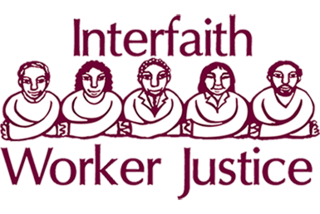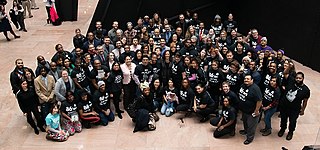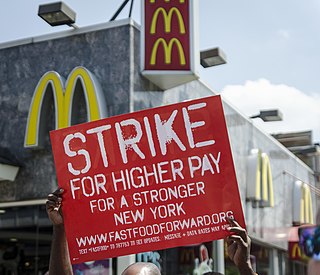Related Research Articles
Labour laws are those that mediate the relationship between workers, employing entities, trade unions, and the government. Collective labour law relates to the tripartite relationship between employee, employer, and union.

The Industrial Workers of the World (IWW), nicknamed "Wobblies", is an international labor union founded in Chicago in 1905. The nickname's origin is uncertain. Its ideology combines general unionism with industrial unionism, as it is a general union, subdivided between the various industries which employ its members. The philosophy and tactics of the IWW are described as "revolutionary industrial unionism", with ties to socialist, syndicalist, and anarchist labor movements.

A sweatshop or sweat factory is a crowded workplace with very poor, socially unacceptable or illegal working conditions. Some illegal working conditions include poor ventilation, little to no breaks, inadequate work space, insufficient lighting, or uncomfortably/dangerously high or low temperatures. The work may be difficult, tiresome, dangerous, climatically challenging or underpaid. Workers in sweatshops may work long hours with unfair wages, regardless of laws mandating overtime pay or a minimum wage; child labor laws may also be violated. Women make up 85 to 90% of sweatshop workers and may be forced by employers to take birth control and routine pregnancy tests to avoid supporting maternity leave or providing health benefits. The Fair Labor Association's "2006 Annual Public Report" inspected factories for FLA compliance in 18 countries including Bangladesh, El Salvador, Colombia, Guatemala, Malaysia, Thailand, Tunisia, Turkey, China, India, Vietnam, Honduras, Indonesia, Brazil, Mexico, and the US. The U.S. Department of Labor's "2015 Findings on the Worst Forms of Child Labor" found that "18 countries did not meet the International Labour Organization's recommendation for an adequate number of inspectors."

The United Farm Workers of America, or more commonly just United Farm Workers (UFW), is a labor union for farmworkers in the United States. It originated from the merger of two workers' rights organizations, the Agricultural Workers Organizing Committee (AWOC) led by organizer Larry Itliong, and the National Farm Workers Association (NFWA) led by César Chávez and Dolores Huerta. They became allied and transformed from workers' rights organizations into a union as a result of a series of strikes in 1965, when the mostly Filipino farmworkers of the AWOC in Delano, California, initiated a grape strike, and the NFWA went on strike in support. As a result of the commonality in goals and methods, the NFWA and the AWOC formed the United Farm Workers Organizing Committee on August 22, 1966. This organization was accepted into the AFL–CIO in 1972 and changed its name to the United Farm Workers Union.

Service Employees International Union (SEIU) is a labor union representing almost 1.9 million workers in over 100 occupations in the United States and Canada. SEIU is focused on organizing workers in three sectors: healthcare, including hospital, home care and nursing home workers; public services ; and property services.

Philip Murray was a Scottish-born steelworker and an American labor leader. He was the first president of the Steel Workers Organizing Committee (SWOC), the first president of the United Steelworkers of America (USWA), and the longest-serving president of the Congress of Industrial Organizations (CIO).
Labor rights or workers' rights are both legal rights and human rights relating to labor relations between workers and employers. These rights are codified in national and international labor and employment law. In general, these rights influence working conditions in relations of employment. One of the most prominent is the right to freedom of association, otherwise known as the right to organize. Workers organized in trade unions exercise the right to collective bargaining to improve working conditions.
Justice for Janitors (JfJ) is a social movement organization that fights for the rights of janitors across the US and Canada. It was started on June 15, 1990, in response to the low wages and minimal health-care coverage that janitors received. Justice for Janitors includes more than 225,000 janitors in at least 29 cities in the United States and at least four cities in Canada. Members fight for better wages, better conditions, improved healthcare, and full-time opportunities.
Community unionism, also known as reciprocal unionism, refers to the formation of alliances between unions and non-labour groups in order to achieve common goals. These unions seek to organize the employed, unemployed, and underemployed. They press for change in the workplace and beyond, organizing around issues such as welfare reform, health care, jobs, housing, and immigration. Individual issues at work are seen as being a part of broader societal problems which they seek to address. Unlike trade unions, community union membership is not based on the workplace- it is based on common identities and issues. Alliances forged between unions and other groups may have a primary identity based on affiliations of religion, ethnic group, gender, disability, environmentalism, neighborhood residence, or sexuality.
Worker centers are non-profit community-based mediating organizations that organize and provide support to communities of low wage workers who are not already members of a collective bargaining organization or have been legally excluded from coverage by U.S. labor laws. Many worker centers in the United States focus on immigrant and low-wage workers in sectors such as restaurant, construction, day labor and agriculture.

Ruth Milkman is an American sociologist of labor and labor movements. She is Distinguished Professor of Sociology at the Graduate Center, CUNY and the director of research at CUNY School of Labor and Urban Studies. Between 1988 and 2009 Milkman taught at the University of California, Los Angeles, where she directed the UCLA Institute for Research on Labor and Employment.

Interfaith Worker Justice (IWJ) was a nonprofit and nonpartisan interfaith advocacy network comprising more than 60 worker centers and faith and labor organizations that advanced the rights of working people through grassroots, worker-led campaigns and engagement with diverse faith communities and labor allies. IWJ affiliates took action to shape policy at the local, state and national levels.
The Chinese Staff and Worker's Association (CSWA) is a nonprofit, nonpartisan workers' rights organization based in New York City which educates and organizes workers in the United States so that they may improve their working conditions. It primarily assists workers in restaurants, the garment and construction industries, although it is active among workers in a variety of professions. The organization serves workers from all backgrounds, most of its members are Chinese and most of its efforts directed at employers in Chinatown.
David John McDonald was an American labor leader and president of the United Steelworkers of America from 1952 to 1965.
The New York State Department of Labor is the department of the New York state government that enforces labor law and administers unemployment benefits.

The California Labor Code, more formally known as "the Labor Code", is a collection of civil law statutes for the State of California. The code is made up of statutes which govern the general obligations and rights of persons within the jurisdiction of the State of California. The stated goal of the Department of Industrial Relations is to promote and develop the welfare of the wage earners of California, to improve their working conditions and to advance their opportunities for profitable employment."

The Restaurant Opportunities Centers United (ROC) is a not-for-profit organization and worker center with affiliates in a number of cities across the United States. Its mission is to improve wages and working conditions for the nation's low wage restaurant workforce. Its tactics and strategy have drawn fire from business groups and restaurant industry lobbyists.

The Fight for $15 is an American political movement advocating for the minimum wage to be raised to USD$15 per hour. The federal minimum wage was last set at $7.25 per hour in 2009. The movement has involved strikes by child care, home healthcare, airport, gas station, convenience store, and fast food workers for increased wages and the right to form a labor union. The "Fight for $15" movement started in 2012, in response to workers' inability to cover their costs on such a low salary, as well as the stressful work conditions of many of the service jobs which pay the minimum wage.

The Congress of Industrial Organizations (CIO) was a federation of unions that organized workers in industrial unions in the United States and Canada from 1935 to 1955. Originally created in 1935 as a committee within the American Federation of Labor (AFL) by John L. Lewis, a leader of the United Mine Workers (UMW), and called the Committee for Industrial Organization. Its name was changed in 1938 when it broke away from the AFL. It focused on organizing unskilled workers, who had been ignored by most of the AFL unions.

Sarumathi "Saru" Jayaraman is an American attorney, author, and activist from Los Angeles, California. She is an advocate for fair wages for restaurant workers and other service workers in the United States. In the aftermath of September 11th, she co-founded the non-profit public service organization Restaurant Opportunities Centers United. And in 2013 she founded a new organization to work on these issues, called One Fair Wage. Jayaraman is a recipient of the Ashoka fellowship in 2013 and the Soros Equality Fellowship in 2020.
References
- ↑ "About Us". Brandworkers International. Archived from the original on 5 September 2012. Retrieved 21 September 2012.
- ↑ "Members". Progressive International. Retrieved 17 April 2021.
- ↑ Greenhouse, Steven (January 20, 2010). "Wild Edibles Settles With Workers' Group Pushing Boycott". New York Times. Retrieved 21 September 2012.
- ↑ Kapp, Trevor (August 19, 2011). "Immigrants win $470,000 settlement for wage fight from Pur Pac, major Chinese restaurant supplier". New York Daily News. Retrieved 21 September 2012.
- ↑ Massey, Daniel (2011-08-21). "Food industry: promise, problems". Crains New York. Retrieved 21 September 2012.